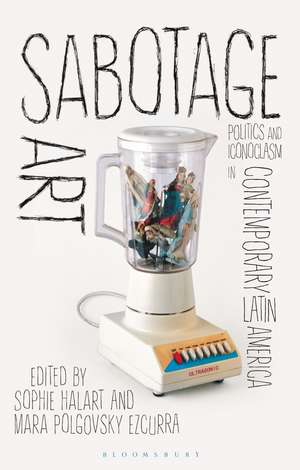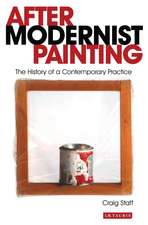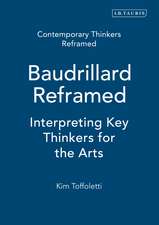Sabotage Art: Politics and Iconoclasm in Contemporary Latin America
Editat de Sophie Halart, Mara Polgovsky Ezcurraen Limba Engleză Paperback – 29 iun 2022
| Toate formatele și edițiile | Preț | Express |
|---|---|---|
| Paperback (1) | 174.83 lei 3-5 săpt. | |
| Bloomsbury Publishing – 29 iun 2022 | 174.83 lei 3-5 săpt. | |
| Hardback (1) | 714.12 lei 3-5 săpt. | |
| Bloomsbury Publishing – 30 mar 2016 | 714.12 lei 3-5 săpt. |
Preț: 174.83 lei
Preț vechi: 225.33 lei
-22% Nou
Puncte Express: 262
Preț estimativ în valută:
33.46€ • 36.36$ • 28.13£
33.46€ • 36.36$ • 28.13£
Carte disponibilă
Livrare economică 31 martie-14 aprilie
Preluare comenzi: 021 569.72.76
Specificații
ISBN-13: 9781350276611
ISBN-10: 1350276618
Pagini: 256
Ilustrații: 56 bw illus
Dimensiuni: 138 x 216 x 19 mm
Greutate: 0.47 kg
Editura: Bloomsbury Publishing
Colecția Bloomsbury Visual Arts
Locul publicării:London, United Kingdom
ISBN-10: 1350276618
Pagini: 256
Ilustrații: 56 bw illus
Dimensiuni: 138 x 216 x 19 mm
Greutate: 0.47 kg
Editura: Bloomsbury Publishing
Colecția Bloomsbury Visual Arts
Locul publicării:London, United Kingdom
Caracteristici
Individual chapters can be used in studies of artists such as Paulo Bruscky, Enrique Guzman, Marcos Kurtycz and Edgardo Antonio Vigo, or the book as a whole serves as an introduction to new methods in Latin American art theory and cultural studies
Notă biografică
Sophie Halart is a Visiting Teaching Fellow at the Universidad Catolica de Chile, Santiago de Chile and a Teaching Fellow at University College London, UK, where she received her PhD on contemporary women artists in the Southern Cone.Mara Polgovsky Ezcurra is Lecturer in History of Art at Birkbeck, University of London, UK and received her PhD in Latin American Cultural Studies from the University of Cambridge, UK.
Cuprins
List of IllustrationsNotes on ContributorsAcknowledgementsIntroduction Mara Polgovsky Ezcurra and Sophie HalartPart I: Ensnaring, Burning, Trespassing: Material Sabotage1. Marta Minujin's Self-Sabotage: From Existentialism to Counterculture Catherine Spencer2. Shaman, Thespian, Saboteur: Marcos Kurtycz and the Ritual Poetics of Iconoclasm Mara Polgovsky Ezcurra3. Pictorial Eviscerations, Emblems, and Self-Immolation in Mexico: Dissensus in the work of Enrique Guzmán and Nahum B. Zenil Erica Segre4. Bureaucratic Sabotage: Knocking at the door of the 'Big Monster' Zanna GilbertPart II: Cannons and Canons: Explosive vs. Implosive Postures 5. Cogs and Clogs: Sabotage as Noise in Post-1960s Chilean and Argentine Art and Art History Sophie Halart6. Impossible Objects: Gabriel Orozco's Empty Shoe Box and Yielding Stone Natasha Adamou 7. El Museo de la Calle. Art, Economy and the Paradoxes of Bartering Olga Fernández López 8. Stay at Your Own Risk: Disturbing Ideas of Community in Two Projects by Elkin Calderón Carla Macchiavello 9. 'The Space of Appearance': Performativity and Aesthetics in the Politicization of Mexico's Public Sphere Robin GreeleyNotesIndex
Recenzii
Nelly Richard once commented on the difficulty of reading the politics of Latin American contemporary art abroad without reducing the works to a testimonial function or, alternatively, stripping them of their incisive concreteness. This wonderful collection speaks to the emergence of a critical discourse on Latin American art that manages to hold form and politics not just in the balance but to read one through the other: a truly groundbreaking achievement.
Sabotage Art provides a welcome shift of emphasis amidst perennial redefinitions of "political art" in Latin America. Framing sabotage as a "positional choice with regard to the institution" allows Halart, Polgovsky Ezcurra and their collaborators to critically interrogate the longstanding association of Latin American art with struggle or "adversity" for both historical case studies and the market delirium over "contemporary art". This book makes for an excellent teaching resource on overlooked artists such as Paulo Bruscky, Enrique Guzman, Marcos Kurtycz, and Edgardo Antonio Vigo, offers fresh examinations of canonized avant-gardes in Argentina and Chile, and considers recent participatory projects in Bogotá and Mexico City. Yet it is most valuable in the sum total of its discrete chapters, which together demonstrate a range of new methods for a field now hitting its stride.
Sabotage Art provides a welcome shift of emphasis amidst perennial redefinitions of "political art" in Latin America. Framing sabotage as a "positional choice with regard to the institution" allows Halart, Polgovsky Ezcurra and their collaborators to critically interrogate the longstanding association of Latin American art with struggle or "adversity" for both historical case studies and the market delirium over "contemporary art". This book makes for an excellent teaching resource on overlooked artists such as Paulo Bruscky, Enrique Guzman, Marcos Kurtycz, and Edgardo Antonio Vigo, offers fresh examinations of canonized avant-gardes in Argentina and Chile, and considers recent participatory projects in Bogotá and Mexico City. Yet it is most valuable in the sum total of its discrete chapters, which together demonstrate a range of new methods for a field now hitting its stride.








